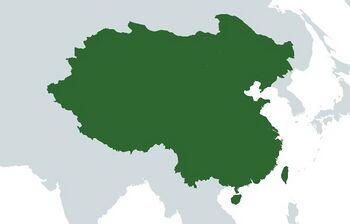Chinese Empire (CM)
Empire of China 中华帝国 (Chinese) Zhōnghuá dìguó (Pinyin) | |
|---|---|
| Motto: Chāoyuè píngyuán hé hǎiyáng "Beyond the Plains and the Seas" | |
| Anthem: 中华帝国国歌 Zhōnghuá dìguó guógē "National Anthem of the Empire of China" | |
 | |
| Capital | Beijing |
| Largest | Shanghai |
| Official languages | Standard Chinese |
| Recognised regional languages | |
| Ethnic groups (2020) |
|
| Religion (2020) |
|
| Demonym(s) | Chinese |
| Government | Unitary parliamentary semi-constitutional monarchy |
• Emperor | Qiaolong Emperor |
| Cao Xuefeng | |
| Legislature | Imperial Assembly |
| Establishment | |
• First pre-imperial dynasty | c. 2070 BCE |
• First imperial dynasty | 221 BCE |
• Current constitution | 1923 |
| Area | |
• | 11,197,274 km2 (4,323,292 sq mi) (2nd) |
• Water (%) | 3.47 |
| Population | |
• 2020 estimate | 1,428,805,307 (1st) |
• Density | 145/km2 (375.5/sq mi) (83rd) |
| GDP (PPP) | 2022 estimate |
• Total | $33.9 trillion (1st) |
• Per capita | $25,645 (68th) |
| GDP (nominal) | 2022 estimate |
• Total | $20.3 trillion (2nd) |
• Per capita | $15,875 (63rd) |
| Gini | 38.5 medium |
| HDI (2022) | high (69th) |
| Currency | Renminbi (CNY) |
| Time zone | UTC+8 (China Standard Time) |
| Date format | dd/mm/yyyy |
| Driving side | right |
| Calling code | +86 |
| ISO 3166 code | CN |
| Internet TLD | .cn |
China (Chinese: 中国; pinyin: Zhōngguó), officially the Empire of China (Chinese: 中华帝国; pinyin: Zhōnghuá dìguó) is a country in East Asia. Numerically, it is the world's most populous country, with a population of around 1.4 billion and the world's second largest country, with a total covered area of 11.1 million square kilometres. Meanwhile, China also consists of approximately 24 provinces, five autonomous regions, and six municipalities. The capital is Beijing while the largest city is Shanghai.
China emerged as one of the world's first civilizations in the fertile basin of the Yellow River in the North China Plain. China was and has continued to be one of the world's foremost economic powers for centuries and so forth. For millennia, prior to its current constitutional monarchy system, China's political system was based on absolute hereditary monarchies, or dynasties, beginning with the semi-legendary Xia dynasty in the 21st century BCE. Since then, China has expanded, fractured, and re-unified numerous times. In the 3rd century BCE, the Qin reunited core China and established the first Chinese empire. The succeeding Han dynasty (206 BCE – 220 CE) saw some of the most advanced technology at that time, including papermaking and the compass, along with agricultural and medical improvements. The invention of gunpowder and movable type in the Tang dynasty (618–907) and Northern Song Dynasty (960–1127) completed the Four Great Inventions. Tang culture spread widely in Asia, as the new Silk Road brought traders to as far as Mesopotamia and the Horn of Africa. In 1636, China's current imperial dynasty, the Qing dynasty was founded in light of the collapse of the previous Ming dynasty, and has continued to rule China ever since.
By the early 20th century, following a series of heavy losses to foreign imperialism during the previous century, China, under the leadership of the Guangxu Emperor, began a gradual transition to a constitutional monarchy, away from its centuries-old absolute monarchy system. In the midst of this, the country was involved in a fierce rivalry with neighbouring Japan, which occasionally devolved into armed conflicts. Since then, under the leadership of successive emperors and prime ministers, China has quickly emerged as a dominant world power, a status it continues to hold to this day.
Officially, China is a unitary parliamentary semi-constitutional monarchy, with the prime minister, who is elected by the general public, undertaking the day-to-day duties of running the country, while the emperor, despite currently retaining a mostly ceremonial role, still possesses some significant powers. In addition to being a founding member of the United Nations, and most notably, a permanent member of the United Nations Security Council, China is also a founding member of several other organisations, namely the Asian Infrastructure Investment Bank, the Silk Road Fund, the Shanghai Cooperation Organisation, and the RCEP. In addition to that, it is also a member of the G8+5, the G20, the APEC, and the East Asia Summit.
With a GDP of $33.9 trillion, China is the world's largest economy, while in nominal terms, it is the second-largest economy in the world, and also the second wealthiest country in the world. Meanwhile, it has consistently been ranked as one of the fastest-growing major economies in the world and is also known as the world's largest manufacturer and exporter. In addition, China is also a recognised nuclear-weapon state, and the country also possesses the world's largest standing army by military personnel and the world's second-largest defence budget.

